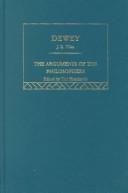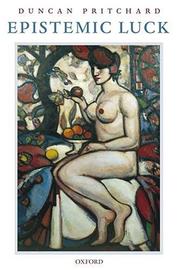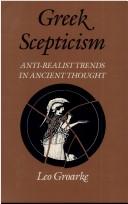| Listing 1 - 10 of 14 | << page >> |
Sort by
|
Book
ISBN: 131749282X 1317492838 1315711737 1282947303 9786612947308 1844654095 9781844654093 9781317492832 9781317492825 9781315711737 9781282947306 6612947306 9781844651306 9781844651313 1844651304 1844651312 9780520259829 0520259823 9780520260269 0520260260 Year: 2009 Publisher: Durham : Acumen Publishing,
Abstract | Keywords | Export | Availability | Bookmark
 Loading...
Loading...Choose an application
- Reference Manager
- EndNote
- RefWorks (Direct export to RefWorks)
Scepticism, a philosophical tradition that casts doubt on our ability to gain knowledge of the world and suggests suspending judgement in the face of uncertainty, has been influential since its beginnings in ancient Greece. Harald Thorsrud provides an engaging, rigorous introduction to the arguments, central themes and general concerns of ancient Scepticism, from its beginnings with Pyrrho of Elis (c.360c.270 BCE) to the writings of Sextus Empiricus in the second century CE. Thorsrud explores the differences among Sceptics and examines in particular the separation of the Scepticism of Pyrrho from its later form Academic Scepticism which arose when its ideas were introduced into Plato's Academy in the third century BCE. He also unravels the prolonged controversy that developed between Academic Scepticism and Stoicism, the prevailing dogmatism of the day. Steering an even course through the many differences of scholarly opinion surrounding Scepticism, Thorsrud provides a balanced appraisal of its enduring significance by showing why it remains so philosophically interesting and how ancient interpretations differ from modern ones.
Book
ISBN: 191370131X 9781913701314 Year: 2000 Publisher: Cambridge, England : Cambridge Philological Society,
Abstract | Keywords | Export | Availability | Bookmark
 Loading...
Loading...Choose an application
- Reference Manager
- EndNote
- RefWorks (Direct export to RefWorks)
Book
ISBN: 9004465545 9004465391 Year: 2021 Publisher: Leiden, The Netherlands ; Boston : Brill,
Abstract | Keywords | Export | Availability | Bookmark
 Loading...
Loading...Choose an application
- Reference Manager
- EndNote
- RefWorks (Direct export to RefWorks)
This work invites us to view the Pyrrhonist tradition as involving all those who share a commitment to the activity of Pyrrhonizing and develops fresh, provocative readings of Sextus, Montaigne, and Hume as radical Pyrrhonizing skeptics: From the aspirationalism of Sextan Pyrrhonism, to Montaigne's skeptical fideism and his unusual approach to the writing process, to the vexing interpretive issues surrounding Hume's skepticism, each figure offers us new insights into what it can mean to Pyrrhonize.
Skeptics (Greek philosophy) --- Pyrrhon, --- Sextus, --- Montaigne, Michel de, --- Hume, David,

ISBN: 1134668619 113814567X 0415203538 1280050233 0585452784 0203458257 0203067770 9780203067772 9780585452784 0415510600 9780415510608 9780203458259 9780415203531 9780415203920 0415203929 9780415184465 0415184460 9781134668564 1134668562 9781134668601 1134668600 9781134668618 0415047722 Year: 1998 Publisher: London ; New York : Routledge,
Abstract | Keywords | Export | Availability | Bookmark
 Loading...
Loading...Choose an application
- Reference Manager
- EndNote
- RefWorks (Direct export to RefWorks)
The Sceptics is the first comprehensive, up-to-date treatment of Greek scepticism, from the beginnings of epistemology with Xenophanes, to the final full development of Pyrrhonism as presented in the work of Sextus Empiricus. Tracing the evolution of scepticism from 500 B.C to A.D 200, this clear and rigorous analysis presents the arguments of the Greek sceptics in their historical context and provides an in-depth study of the various strands of the sceptical tradition.
Skeptics (Greek philosophy) --- Philosophy, Ancient. --- Ancient philosophy --- Greek philosophy --- Philosophy, Greek --- Philosophy, Roman --- Roman philosophy --- Philosophy, Ancient --- Theory of knowledge --- Antiquity --- Knowledge, Theory of. --- Sextus, --- Skeptics (Greek philosophy).

ISBN: 0191602299 0191535664 1281190888 9786611190880 1435621972 9780191535666 9780191602290 9780199280384 019928038X 9780199229789 019928038X Year: 2005 Publisher: Oxford : New York : Clarendon Press ; Oxford University Press,
Abstract | Keywords | Export | Availability | Bookmark
 Loading...
Loading...Choose an application
- Reference Manager
- EndNote
- RefWorks (Direct export to RefWorks)
Offering a philosophical examination of the concept of luck and its relationship to knowledge, this text demonstrates how a more nuanced understanding of the relationship between knowledge and luck can enable us to see past some of the most intractable disputes in the contemporary theory of knowledge.
Knowledge, Theory of. --- Chance. --- Skepticism. --- Chance --- Knowledge, Theory of --- Skepticism --- Skeptics (Greek philosophy)

ISBN: 9786612365614 1282365614 0191540196 9780191540196 9780191578304 0191578304 9780191776359 0191776351 0192853570 9780192853578 6612365617 9781282365612 Year: 2000 Publisher: Oxford ; New York : Oxford University Press,
Abstract | Keywords | Export | Availability | Bookmark
 Loading...
Loading...Choose an application
- Reference Manager
- EndNote
- RefWorks (Direct export to RefWorks)
Getting away from the presentation of ancient philosophy as a succession of Great Thinkers, the book aims to give readers a sense of the freshness and liveliness of ancient philosophy, and of its wide variety of themes and styles.
Philosophy, Ancient. --- Skeptics (Greek philosophy) --- Philosophy, Ancient --- Ancient philosophy --- Greek philosophy --- Philosophy, Greek --- Philosophy, Roman --- Roman philosophy
Book
ISBN: 1281993247 9786611993245 3110209675 3110195054 9783110195057 9783110209679 Year: 2008 Volume: 249 Publisher: Berlin ; New York : De Gruyter,
Abstract | Keywords | Export | Availability | Bookmark
 Loading...
Loading...Choose an application
- Reference Manager
- EndNote
- RefWorks (Direct export to RefWorks)
Der tschechische Philologe Karel Janáček (1906 - 1996) war "the most eminent Sextan scholar of the century" (Jonathan Barnes). Neben seinen beiden Sextus-Monographien (Prolegomena to Sextus Empiricus, 1948; Sextus Empiricus' Sceptical Methods, 1972) und seinen Indices zu Sextus und zu Diogenes Laertius veröffentlichte er insgesamt fünfzig Artikel zu Sextus und den mit Sextus zusammenhängenden Themen. Es handelt sich um methodologisch streng geführte philologische Untersuchungen, die ein neues Licht auf Sextus' Werk und dessen Beziehungen zu anderen Autoren wie Diogenes Laertius, Hippolyt von Rom und Philon von Alexandrien geworfen haben. Die Studien wie "Sextus Empiricus an der Arbeit" oder "Die Hauptschrift des Sextus Empiricus als Torso erhalten?" stellen Meisterstücke philologischer Forschung dar. Janáčeks im Laufe von mehr als fünfzig Jahren in schwierig auffindbaren Zeitschriften und Sammelbänden veröffentlichten Studien liegen alle in diesem Band versammelt vor. Zehn ursprünglich auf tschechisch verfassten Studien - darunter eine eingehende "Analyse der Berichte über die Philosophie der Gorgias" - erscheinen hier zum ersten Mal in der Übertragung ins Deutsche. Der Band wird durch eine Würdigung von Karl Janáčeks wissenschaftlichem Œuvre und Persönlichkeit eingeleitet.
Skeptics (Greek philosophy) --- Diogenes Laertius. --- Sextus, --- Sceptiques (Philosophie grecque) --- Sekst, --- Sesto, --- Sextos, --- Sexto, --- Sextus Empiricus --- Diogene Laerzio --- Diogène Laërce --- Laerzio, Diogene --- Philosophy, Ancient --- Sekstus, --- Philosophy (ancient). --- skepticism.
Book
ISBN: 9780521513913 052151391X 9781139549042 1139549049 113955400X 9781139554008 1316088839 1139563890 1283574861 9786613887313 1139550292 1139555251 113955154X 1139048813 1107532272 9781107532274 Year: 2012 Publisher: Cambridge ; New York : Cambridge University Press,
Abstract | Keywords | Export | Availability | Bookmark
 Loading...
Loading...Choose an application
- Reference Manager
- EndNote
- RefWorks (Direct export to RefWorks)
Sextus Empiricus' Against the Physicists examines numerous topics central to ancient Greek inquiries into the nature of the physical world, covering subjects such as god, cause and effect, whole and part, bodies, place, motion, time, number, coming into being and perishing and is the most extensive surviving treatment of these topics by an ancient Greek sceptic. Sextus scrutinizes the theories of non-sceptical thinkers and generates suspension of judgement through the assembly of equally powerful opposing arguments. Richard Bett's edition provides crucial background information about the text and elucidation of difficult passages. His accurate and readable translation is supported by substantial interpretative aids, including a glossary and a list of parallel passages relating Against the Physicists to other works by Sextus. This is an indispensable edition for advanced students and scholars studying this important work by an influential philosopher.
Philosophy --- Philosophie --- Early works to 1800. --- Ouvrages avant 1800 --- Sextus, --- Sekst, --- Sesto, --- Sexto, --- Sextos, --- Sekstus, --- Philosophy - Early works to 1800 --- Philosophy, Ancient --- Skeptics (Greek philosophy)

ISBN: 0773507566 9786612851629 1282851624 0773562443 9780773507562 9780773562448 9781282851627 6612851627 Year: 1990 Volume: 14 Publisher: Montreal ; Buffalo : McGill-Queen's University Press,
Abstract | Keywords | Export | Availability | Bookmark
 Loading...
Loading...Choose an application
- Reference Manager
- EndNote
- RefWorks (Direct export to RefWorks)
In Greek Scepticism Leo Groarke presents a more sympathetic and accurate account of Greek scepticism and its relevance to modern and contemporary thought. He begins with an account of the development of scepticism in pre-Socratic times and concludes with a discussion of the relationship of scepticism to modern and contemporary epistemology. Groarke argues that the sceptics posed the problems central to both ancient and modern epistemology, and that in fact scepticism is the ancient analogue of anti-realist trends which are thought to be uniquely modern. He also shows that scepticism is not simply negative, but offers a positive philosophy which mitigates the sceptical critique of knowledge. Greek Scepticism undermines our usual account of the development of modern epistemology. Groarke shows that the separation of the mind and the external world that is generally attributed to Descartes is actually an integral part of ancient scepticism. In discussing the major problems that stem from this distinction, ancient scepticism anticipates thinkers such as Berkeley, Kant, and Hume. Groarke maintains, controversially, that the doubts of the ancient sceptics are deeper and epistemologically more significant than those of the philosophers usually discussed today.
Skeptics (Greek philosophy) --- Philosophy, Ancient. --- Philosophy, Ancient --- Ancient philosophy --- Greek philosophy --- Philosophy, Greek --- Philosophy, Roman --- Roman philosophy --- Anti-realism --- Antirealism --- Philosophy --- History
Book
ISBN: 1442619724 9781442619722 9781442649217 1442649216 1442619732 Year: 2015 Publisher: Toronto, [Ontario] : University of Toronto Press,
Abstract | Keywords | Export | Availability | Bookmark
 Loading...
Loading...Choose an application
- Reference Manager
- EndNote
- RefWorks (Direct export to RefWorks)
Surveying the use of skepticism in works by Hobbes, Descartes, Hume, Smith, and Kant, among others, these essays demonstrate the pervasive impact of skepticism on the intellectual landscape of early modern Europe.
Skepticism --- Skeptics (Greek philosophy) --- Philosophy, Ancient --- Scepticism --- Unbelief --- Agnosticism --- Belief and doubt --- Free thought --- Political aspects --- History --- Sextus, --- Sekst, --- Sesto, --- Sexto, --- Sextos, --- Sekstus,
| Listing 1 - 10 of 14 | << page >> |
Sort by
|

 Search
Search Feedback
Feedback About UniCat
About UniCat  Help
Help News
News